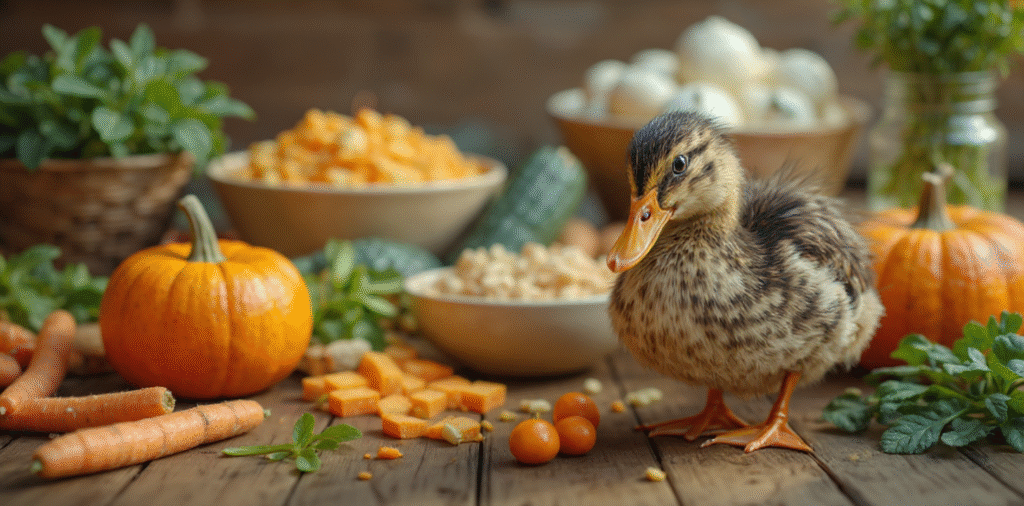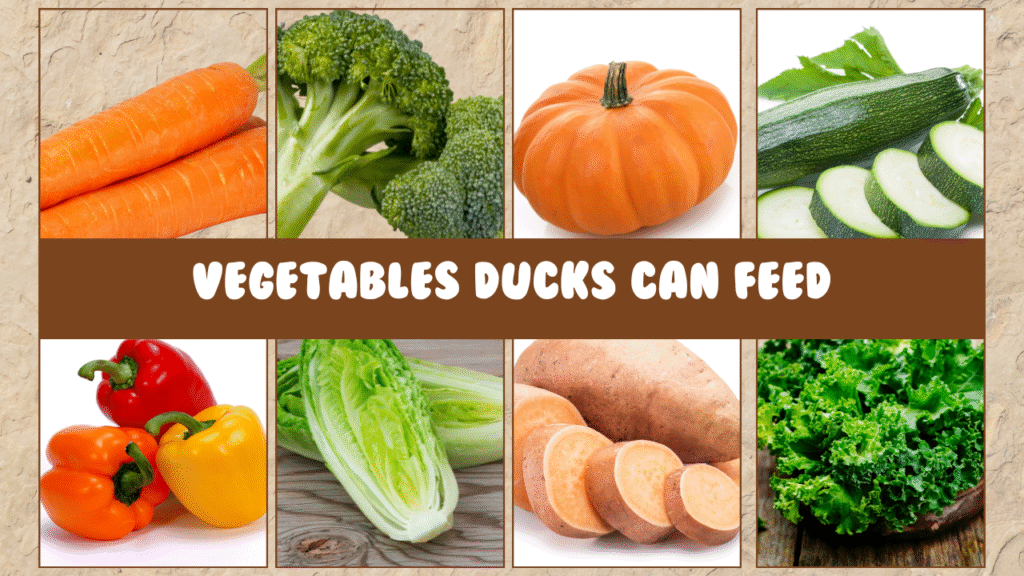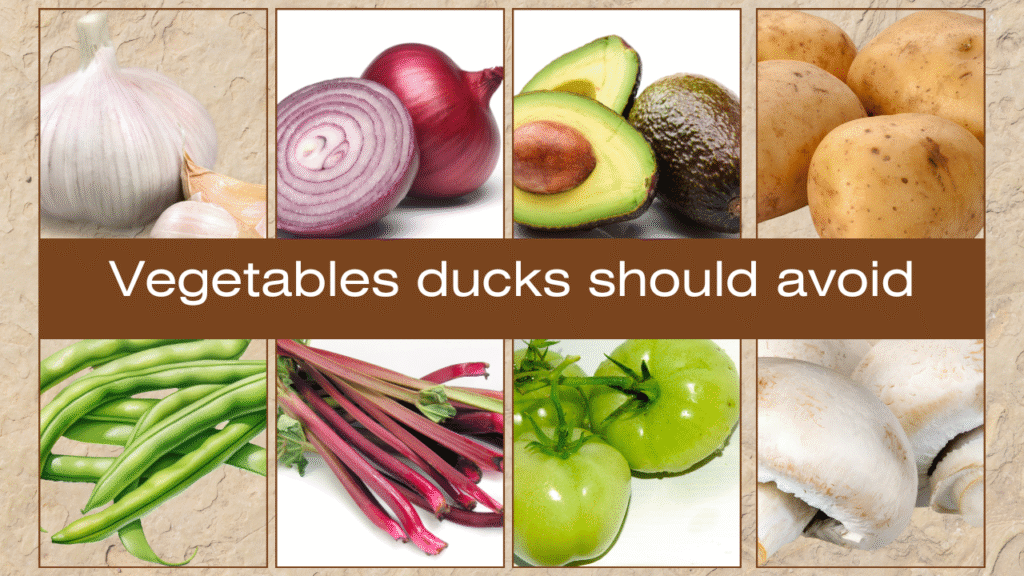With over 40 million domestic ducks raised in North America annually and backyard poultry keeping growing by 23% each year, more people than ever are caring for these delightful waterfowl.
While ducks are omnivores with varied diets in the wild – consuming up to 60 different types of aquatic plants, insects, and small creatures – not all vegetables are suitable for ducks. Research shows that improper feeding causes approximately 30% of preventable health issues in domestic waterfowl, making dietary knowledge crucial for duck welfare.
This comprehensive guide will walk you through the safe vegetable options, dangerous foods to avoid, and best practices for supplementing a duck’s diet with fresh produce.

Table of Contents
ToggleUnderstanding Duck Nutrition Basics
Before diving into specific vegetables, it’s important to understand that ducks have unique nutritional needs. In their natural habitat, ducks consume aquatic plants, seeds, small fish, insects, and various vegetation. Their digestive systems are designed to process a diverse range of foods, but domesticated ducks rely on their caretakers to provide balanced nutrition.
A duck’s diet should primarily consist of high-quality waterfowl feed that provides essential proteins, vitamins, and minerals. Vegetables should only supplement this base diet, comprising no more than 10-20% of their total food intake. This ensures they receive adequate nutrition while enjoying the variety and enrichment that fresh vegetables provide.
Safe Vegetables for Ducks
| Vegetable | Preparation | Benefits | Notes |
|---|---|---|---|
| Romaine Lettuce | Raw, chopped | Vitamin A, folate, fiber | Preferred over iceberg |
| Spinach | Raw, small amounts | Iron, vitamins | Limit due to oxalates |
| Kale | Raw or steamed | Vitamins A, C, K | Nutritional powerhouse |
| Carrots | Grated or cooked | Beta-carotene, fiber | Must be chopped to prevent choking |
| Sweet Potato | Cooked, mashed | Vitamins A, C, fiber | Never serve raw |
| Pumpkin | Raw or cooked, seeds OK | Fiber, natural deworming | Remove hard skin |
| Zucchini | Raw, grated | Hydration, mild flavor | Well-tolerated by most ducks |
| Cucumber | Raw, chopped | Hydration, cooling | Remove seeds for ducklings |
| Bell Peppers | Raw, seeds removed | Vitamin C, color variety | All colors safe |
| Broccoli | Steamed lightly | Vitamins, minerals | Small amounts only |
Leafy Greens: The Nutritional Powerhouses
Leafy greens are among the best vegetable choices for ducks. These nutrient-dense foods closely resemble the aquatic vegetation ducks would naturally consume.
Lettuce varieties like romaine, butter lettuce, and green leaf lettuce are excellent choices. However, avoid iceberg lettuce as it lacks nutritional value and can cause digestive issues. Romaine lettuce is particularly beneficial, providing vitamin A, folate, and fiber.
Spinach is safe in moderation but should be offered sparingly due to its high oxalate content, which can interfere with calcium absorption when consumed in large quantities. Baby spinach is preferable to mature leaves.
Kale and collard greens are nutritional superstars, packed with vitamins A, C, and K. These hearty greens can be offered fresh or lightly steamed to make them easier to digest.
Chard and arugula provide variety and different flavor profiles that many ducks enjoy. These can be mixed with other greens for a diverse salad.

Root Vegetables: Energy and Fiber Sources
Root vegetables offer carbohydrates and fiber that can benefit duck digestion when prepared properly.
Carrots are a favorite among many ducks. They should be grated, chopped, or cooked to prevent choking. Carrots provide beta-carotene, which converts to vitamin A and supports eye health and immune function.
Sweet potatoes are another excellent choice when cooked and mashed or cut into small pieces. They’re rich in vitamins A and C, plus beneficial fiber. Never feed raw sweet potatoes, as they’re difficult for ducks to digest.
Beets can be offered cooked and chopped. While some ducks enjoy them, others may be put off by the strong flavor. Start with small amounts to gauge your ducks’ preferences.
Turnips and rutabagas are safe when cooked and chopped appropriately. These provide variety and different textures that can enrich feeding time.
Squash Family: Seasonal Favorites
Members of the squash family are generally safe and nutritious for ducks.
Pumpkin is particularly beneficial, especially the flesh and seeds. Pumpkin seeds are believed to have natural deworming properties, while the flesh provides vitamins and fiber. Remove the hard outer skin and cut into appropriate-sized pieces.
Zucchini and summer squash can be offered raw when grated or chopped into small pieces. These vegetables are mild in flavor and well-tolerated by most ducks.
Winter squashes like butternut and acorn squash should be cooked until soft before serving. Remove seeds and skin, then mash or chop into duck-friendly portions.
Other Safe Vegetable Options
Cucumbers are hydrating and refreshing, especially during hot weather. Remove seeds for younger ducklings and chop appropriately for adult ducks.
Bell peppers of all colors are safe when seeds and stems are removed. They provide vitamin C and add color variety to the diet.
Broccoli and cauliflower can be offered in small amounts. Steam lightly to make them easier to digest, and chop into small florets.
Cabbage is safe in moderation but can cause gas if overfed. Offer small amounts and observe your ducks’ reactions.
Vegetables to Avoid: The Danger List
Several vegetables pose serious health risks to ducks and should never be offered. The table below provides a quick reference, but understanding why these foods are dangerous helps ensure you never accidentally harm your ducks.
| Vegetable | Danger Level | Why Dangerous | All Forms |
|---|---|---|---|
| Onions | TOXIC | Causes anemia, destroys red blood cells | Raw, cooked, powdered |
| Garlic | TOXIC | Causes anemia, destroys red blood cells | Raw, cooked, powdered |
| Avocado | TOXIC | Contains persin – fatal to birds | Fruit, pit, leaves, bark |
| Raw Potatoes | TOXIC | Solanine poisoning | Green potatoes, skins, sprouted |
| Rhubarb Leaves | TOXIC | High oxalic acid content | Leaves especially dangerous |
| Raw Beans | TOXIC | Lectins cause digestive damage | All varieties when uncooked |
| Green Tomatoes | HARMFUL | Solanine content | Green/unripe tomatoes only |
| Mushrooms | AVOID | Many varieties toxic | Wild mushrooms especially |
Toxic Vegetables
Onions, garlic, and chives contain compounds that can cause anemia in ducks by damaging red blood cells. This includes all forms – raw, cooked, or powdered.
Avocado contains persin, a compound that’s toxic to many birds, including ducks. All parts of the avocado plant are dangerous.
Raw potatoes and potato skins contain solanine, especially when green or sprouted. This compound can cause digestive upset and more serious health issues.
Rhubarb leaves are highly toxic due to oxalic acid content. While the stalks are sometimes considered safe, it’s best to avoid rhubarb entirely.
Raw beans of any variety contain lectins that can be harmful to ducks. This includes kidney beans, lima beans, and others in their uncooked state.

Additional Dangerous Foods to Remember
Beyond the vegetables listed in the danger table, there are other foods that ducks should never consume:
Caffeinated products including coffee grounds and tea leaves can cause heart problems and hyperactivity in ducks.
Salty snacks like chips or crackers can lead to salt poisoning, causing excessive thirst, kidney problems, and potentially death.
Moldy or spoiled vegetables of any kind can contain mycotoxins that are extremely harmful to waterfowl.
Vegetables to Limit or Prepare Carefully
Tomatoes should be offered sparingly and only when ripe. Green tomatoes and tomato plants contain solanine and should be avoided entirely.
Asparagus isn’t toxic but is difficult for ducks to digest and provides minimal nutritional benefit.
Corn technically a grain, not a vegetable, but worth mentioning as it should be offered in moderation due to its high carbohydrate content.
Preparation and Feeding Guidelines
Proper preparation is crucial for safe vegetable feeding. Always wash vegetables thoroughly to remove pesticides and dirt. Cut vegetables into appropriate sizes – pieces should be small enough to prevent choking but large enough to provide enrichment through foraging behavior.
For harder vegetables like carrots or sweet potatoes, cooking makes them easier to digest. Steam or boil until tender, then allow to cool completely before serving. Never add salt, seasonings, or oils during cooking.
Introduce new vegetables gradually, offering small amounts while observing your ducks for any adverse reactions. Some ducks are pickier eaters than others, so patience may be required when introducing new foods.
Feeding Best Practices
Establish a routine for vegetable feeding, offering fresh produce at the same time each day. This helps with digestion and creates positive associations with feeding time.
Remove any uneaten vegetables after a few hours to prevent spoilage and pest attraction. Rotting vegetables can harbor harmful bacteria and create unsanitary conditions.
Provide vegetables in shallow dishes or scatter them in clean areas to encourage natural foraging behaviors. This mental stimulation is as important as the nutritional benefits.
Always ensure fresh, clean water is available when feeding vegetables, as ducks need water to help process their food properly.
